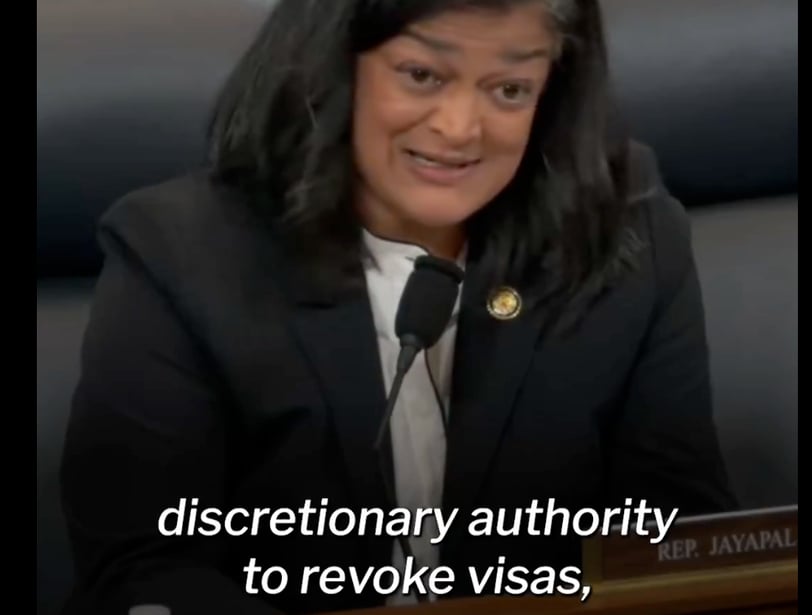The Clash Over Free Speech and National Security: Rümeysa Öztürk's Visa Revocation Sparks Debate
5/22/20253 min read


The Clash Over Free Speech and National Security: Rümeysa Öztürk's Visa Revocation Sparks Debate
In the heart of Washington, D.C., a heated exchange unfolded that has reignited the perennial debate over the delicate balance between free speech and national security. On March 21, 2025, the State Department, under the leadership of Secretary Marco Rubio, approved the revocation of a student visa for Rümeysa Öztürk, a Turkish graduate student at Tufts University. This decision came shortly after Öztürk co-authored an op-ed in her student newspaper, voicing support for Palestinians in Gaza. The aftermath saw Öztürk detained and transported to a prison in Louisiana, an action that Representative Pramila Jayapal vehemently criticized in a recent congressional hearing.
The Incident Unfolds
The video from the hearing, shared by Rep. Jayapal on X, captures a tense moment where she questions Rubio's discretionary authority to revoke visas based on perceived threats to U.S. foreign policy. Jayapal's pointed inquiry, "Does it say somewhere that Marco Rubio gets to determine whether which speech is appropriate and revoke student visas based on what you think constitutes free speech?" underscores the core of the controversy. Rubio's response, invoking statutory authority under the Immigration and Nationality Act, did little to quell the rising concerns over the erosion of First Amendment rights.
Öztürk's case is not isolated. It is part of a broader crackdown on pro-Palestinian voices, with Rubio boasting of revoking thousands of visas as part of a hardline immigration agenda. This policy has drawn sharp criticism, especially given the lack of concrete evidence linking Öztürk's op-ed to support for designated terrorist organizations, as claimed by a Department of Homeland Security spokesperson.
Legal and Ethical Dimensions
The legal foundation for such actions lies in 8 U.S.C. 1155, which grants the Secretary of Homeland Security broad discretion to revoke approved visa petitions. However, this discretion has been contentious, particularly when applied to cases where the connection between the individual's actions and national security is tenuous. The revocation process, often initiated through a Notice of Intent to Revoke (NOIR), requires "good and sufficient cause," a standard that many argue was not met in Öztürk's case.
Ethically, the implications are profound. The detention of Öztürk, described by her lawyers as a kidnapping off the streets, raises questions about the proportionality of the response and the potential chilling effect on free speech, especially among international students. The internal State Department memo, which concluded that there were insufficient grounds for the revocation due to protections of free speech, further complicates the narrative, suggesting a disconnect between policy execution and legal rationale.
Public and Political Backlash
The backlash has been swift and multifaceted. A survey by The Associated Press-NORC Center for Public Affairs research indicates that a majority of Americans oppose the revocation of visas for individuals involved in pro-Palestinian protests, highlighting a disconnect between policy and public sentiment. Legal challenges are mounting, with advocates arguing that such actions infringe on constitutional rights and set a dangerous precedent for censorship.
Rep. Jayapal's post on X, garnering significant attention, amplifies these concerns, positioning the incident as a litmus test for the administration's commitment to democratic values. The replies to her post reveal a polarized landscape, with some defending Rubio's actions as necessary for national security, while others decry them as an overreach that undermines the very principles America stands for.
Broader Implications
This incident is symptomatic of a larger trend where national security concerns are increasingly invoked to justify actions that impinge on civil liberties. The Trump administration's aggressive deportation and visa revocation policies, part of a wider effort to fulfill a hardline immigration agenda, have sparked a national conversation about the limits of executive power and the role of Congress in overseeing such actions.
The case of Rümeysa Öztürk serves as a stark reminder of the tensions inherent in balancing security and freedom. It challenges us to consider whether the discretionary authority granted to executive officials is being wielded responsibly, or if it is being used to silence dissent under the guise of protecting national interests.
Thought Questions
How should the U.S. balance national security concerns with the protection of free speech, especially for international students?
What role should Congress play in overseeing the discretionary authority of executive officials in visa revocation cases?
Does the current legal framework under 8 U.S.C. 1155 adequately protect against potential abuses of power, or does it need reform?
This debate is far from over, and its resolution will shape the future of civil liberties in America. As we navigate these complex waters, the voices of those like Rümeysa Öztürk remind us of the stakes involved in safeguarding the principles that define our democracy.
Explore deep insights on current events and growth.
Vision
Truth
hello@insightoutvision.com
+1-2236036419
© 2025. All rights reserved.
